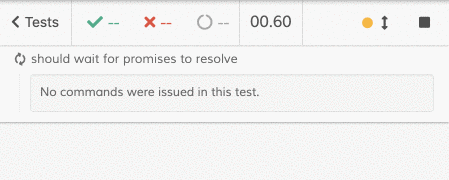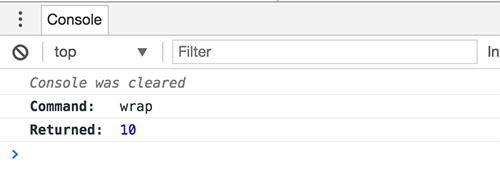wrap
Yield the object passed into .wrap(). If the object is a promise, yield its
resolved value.
Syntax
cy.wrap(subject)
cy.wrap(subject, options)
Usage
Correct Usage
cy.wrap({ name: 'Jane Lane' })
Arguments
subject (Object)
An object to be yielded.
options (Object)
Pass in an options object to change the default behavior of cy.wrap().
| Option | Default | Description |
|---|---|---|
log | true | Displays the command in the Command log |
timeout | defaultCommandTimeout | Time to wait for cy.wrap() to resolve before timing out |
Yields
cy.wrap()yields the object it was called with.
Examples
Objects
Invoke the function on the subject in wrap and return the new value
const getName = () => {
return 'Jane Lane'
}
cy.wrap({ name: getName }).invoke('name').should('eq', 'Jane Lane') // true
Elements
Wrap elements to continue executing commands
cy.get('form').within(($form) => {
// ... more commands
cy.wrap($form).should('have.class', 'form-container')
})
Conditionally wrap elements
cy.get('button').then(($button) => {
// $button is a wrapped jQuery element
if ($button.someMethod() === 'something') {
// wrap this element so we can
// use cypress commands on it
cy.wrap($button).click()
} else {
// do something else
}
})
Promises
You can wrap promises returned by the application code. Cypress commands will automatically wait for the promise to resolve before continuing with the yielded value to the next command or assertion. See the Logging in using application code recipe for the full example.
Simple example
const myPromise = new Promise((resolve, reject) => {
// we use setTimeout(...) to simulate async code.
setTimeout(() => {
resolve({
type: 'success',
message: 'It worked!',
})
}, 2500)
})
it('should wait for promises to resolve', () => {
cy.wrap(myPromise).its('message').should('eq', 'It worked!')
})

Application example End-to-End Only
// import application code for logging in
import { userService } from '../../src/_services/user.service'
it('can assert against resolved object using .should', () => {
cy.log('user service login')
const username = Cypress.env('username')
cy.task('getSecret', 'PASSWORD').then((password) => {
// wrap the promise returned by the application code
cy.wrap(userService.login(username, password))
// check the yielded object
.should('be.an', 'object')
.and('have.keys', ['firstName', 'lastName', 'username', 'id', 'token'])
.and('contain', {
username: 'test',
firstName: 'Test',
lastName: 'User',
})
// cy.visit command will wait for the promise returned from
// the "userService.login" to resolve. Then local storage item is set
// and the visit will immediately be authenticated and logged in
cy.visit('/')
// we should be logged in
cy.contains('Hi Test!').should('be.visible')
})
Note: .wrap() will not synchronize asynchronous function calls for you.
For example, given the following example:
- You have two async functions
async function foo() {...}andasync function bar() {...} - You need to make sure
foo()has resolved first before invokingbar() bar()is also dependent on some data that is created while after calling other Cypress commands.
If you wrap the asynchronous
functions in cy.wrap(), then bar() may be called prematurely before the
required data is available:
cy.wrap(foo())
cy.get('some-button').click()
cy.get('some-input').type(someValue)
cy.get('some-submit-button').click()
// this will execute `bar()` immediately without waiting
// for other cy.get(...) functions to complete
cy.wrap(bar()) // DON'T DO THIS
This behavior is due to the function invocation foo() and bar(), which call
the functions immediately to return a Promise.
If you want bar() to execute after
foo() and the cy.get() commands, one solution is to chain
off the final command using .then():
cy.wrap(foo())
cy.get('some-button').click()
cy.get('some-input').type(someValue)
cy.get('some-submit-button')
.click()
.then(() => {
// this will execute `bar()` after the
// other cy.get(...) functions complete
cy.wrap(bar())
})
Rules
Requirements
cy.wrap()requires being chained off ofcy.
Assertions
cy.wrap(), when its argument is a promise, will automatically wait until the promise resolves. If the promise is rejected,cy.wrap()will fail the test.cy.wrap()will automatically retry until all chained assertions have passed.
Timeouts
cy.wrap()can time out waiting for assertions you've added to pass.
Command Log
Make assertions about object
cy.wrap({ amount: 10 }).should('have.property', 'amount').and('eq', 10)
The commands above will display in the Command Log as:

When clicking on the wrap command within the command log, the console outputs
the following:

History
| Version | Changes |
|---|---|
| 3.2.0 | Retry cy.wrap() if undefined when followed by .should() |
| 0.4.5 | cy.wrap() command added |